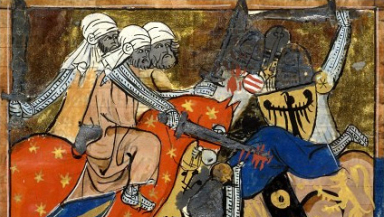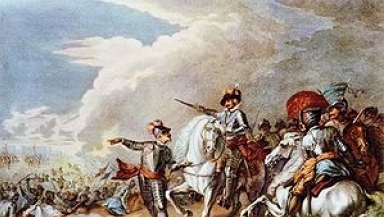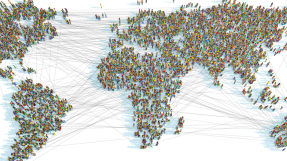President Obama ran into a storm of criticism when he compared atrocities committed by Islamist terrorists with those committed by the Crusaders and the Inquisition, and pointed out that US defenders of slavery and the lynching of black people justified their arguments on religious grounds. Conservative critics accused him of being un-American and un-Christian.
Doesn't President Obama get into trouble every time he mentions religion?
It does seem to be a thing. A sizeable number of Americans seriously believe that he is really a Muslim, in spite of all the evidence, and his Christian faith is constantly called into question. At the National Prayer Breakfast he succeeded in pouring oil on to troubled flames.
What's the issue this time?
Lots of people are outraged that he compared bad things done by Christians to bad things done by Muslims. For instance, former Virginia governor Jim Gilmore said: "The president's comments this morning at the prayer breakfast are the most offensive I've ever heard a president make in my lifetime. He has offended every believing Christian in the United States. This goes further to the point that Mr Obama does not believe in America or the values we all share."
But what exactly are they complaining about?
Essentially there are three things: first, the Crusades and the Inquisition weren't that bad, really; second, they were a long time ago; and third, they were obviously un-Christian while the actions of Islamic State are not obviously un-Muslim.
You can't be serious.
All of these points have been made very seriously.
So, the Inquisition?
The Inquisition was a set of institutions within the Roman Catholic Church charged with preserving it from heresy. It did this by means of burning people at the stake, torture through hanging people from chains, the rack, the thumbscrews and other measures too gruesome to describe on a family website. The idea was that it was better for the body to suffer than the soul to perish. Protestants bought in to the idea as well, though not to the same extent; both faiths persecuted people suspected of witchcraft, for instance, with up to 100,000 executions between 1400 and 1700. The last execution was in Spain, as late as 1826.
And the Crusades?

They lasted for around 200 years, from 1095-1291, and involved several expeditions by Western countries to the Holy Land to reclaim it from the Muslims, who had taken it from the declining Byzantine empire. The Crusader kingdom of Outremer was a small regional power for around 200 years before the Franks were overwhelmed.
On their way to the Holy Land the crusaders often massacred Jews (around 5,000 in Germany) and other Christians (as they passed through the lands of the Byzantines they assumed the inhabitants were Muslims because their crosses were of a different shape, and butchered them). The great historian of the Crusades, Stephen Runciman, described it as a "barbarian invasion". Richard the Lion Heart notoriously ordered the killing of 2,700 Muslim prisoners after the siege of Acre, with their wives and children. In 1204 the crusaders sacked the Christian city of Constantinople itself. The total death toll from all causes is estimated at around 1.7 million. Islamic State still has some way to go, but don't say that at a National Prayer Breakfast.
And slavery?
Bible-believing Christians defended slavery in the US – and, contra William Wilberforce, in the UK – for many years, just as they defended apartheid in South Africa.
This all seems pretty clear. Christians have obviously done horrible things, and so have Muslims.
Well, you would think so. But for instance, Russell Moore, president of the Southern Baptist Ethics and Religious Liberty Commission, said that "The evil actions that [Obama] mentioned were clearly outside the moral parameters of Christianity itself and were met with overwhelming moral opposition from Christians. "
Is that true?
No, it is not. Slavery persisted for hundreds of years because most Christians thought it was fine. Most Christians thought that heretics and witches should be executed and that it was OK to kill Muslims because they were the enemy. Those were very violent times, and killing was normal. Certainly, today we would say that such actions were "outside the moral parameters of Christianity", but that's a bit of a cop-out – Christians did them, sincerely believing they were doing the right thing, which was Obama's point.
But isn't it obvious that Jesus was a peacemaker and that Christianity is religion of peace?
It might be to us, but historically that has just not been the case. And it is very difficult to persuade Muslims, say, of that, given the recent wars 'Christian' nations have fought. The truth is that most Christians have always found it necessary to justify violence in their own interests or their national interests. At different times in history, religion has been one of these interests.
But it isn't now, surely?
It's quite true that no sensible Christian now would regard it as justifiable to torture or kill someone on the grounds of their religion – though a Christian politician objected last week to a memorial to eight Irish women convicted of witchcraft in 1711 because he didn't know whether they had been wrongly convicted or not, which is worrying. However, this sits uneasily with some of the rhetoric used in Western nations about defending Western 'values' when this seems to involve killing large numbers of Muslims. Of course, from the Western point of view there is a difference between Muslims who live peacefully as good citizens and those who engage in violent jihad, who just need to be stopped. This distinction is not always clear to Muslims who feel themselves to be part of the 'ummah', the world-wide Muslim community, and who still characterise the West as 'crusaders'.
But at least it's true that the Crusades were a long time ago and that we don't do that now?

Many people would argue that Christianity, in dialogue with a general improvement in our understanding of human rights and the worth of the individual, has made greater moral advances than Islam in this area. Examples of 'political Christianity' aimed at establishing the Kingdom of God through violent revolution include the English Civil War (arguably, and it's complicated) and China's Taiping Rebellion (1850-64), thought to have cost around 30 million lives. Nowadays this sort of thing is unthinkable for almost all Christians (the depredations of the Lord's Resistance Army are a special case). A larger number of Muslims are attracted to the idea. However, it has to be said very, very clearly that talking about 'Muslims' and 'Christians' as single entities is not always helpful or accurate: it depends which Muslims, where they live and what their history and culture are. Ditto for Christians.
So what was Obama's point?
He was saying that religion of whatever brand can be perverted and used to justify terrible crimes, and that rather than painting Christians as 'good' and Muslims as 'bad', we should recognise that we are all sinners who can be tempted to use faith for bad ends. The reaction to his words is really, really worrying, because it shows that a lot of people assume that he was attacking Christianity when really he was just asking Christians to think a little harder and be a bit more humble. It reflects a blinkered tribalism and a lack of the most elementary capacity for self-criticism.
Stephen Runciman, who knew more about the Crusades than anyone, concluded at the end of his three-volume history: "The triumphs of the Crusades were the triumphs of faith. But faith without wisdom is a dangerous thing ... The historian as he gazes back across the centuries at their gallant story must find his admiration overcast by sorrow at the witness that it bears to the limitations of human nature."
Be told.
Follow @RevMarkWoods on Twitter.













